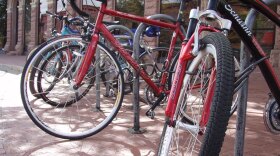Air quality on busy roads usually isn't all that great. But while getting to and from work, commuters -- whether they drive or ride bikes -- are often on busy roads. Colorado State University mechanical engineering professor John Volckens wanted to see if there was a way to change commutes to limit exposure to dirty air.
"We wanted to figure out a way so that people could empower themselves to make choices to reduce their exposure to air pollution during commuting," said Volckens.
To see if there was an easy way to do this, 45 commuters were outfitted with backpacks containing multiple air quality measuring instruments and turned loose on the streets of Fort Collins.
The commuters went on four types of journeys to and from work. They traveled the most direct way by both bike and car, and also drove and rode on a more indirect but less busy route.
What Volckens found was somewhat surprising. Bike commuters, when compared with those in cars, actually have higher exposure to some types of air pollutants, including particulate matter and black carbon.
"What we find is that if you are biking on a direct route, a high-traffic route, in general you are going to receive a higher exposure to air pollution [than someone in a car on the same route]," said Volckens.
Switching to a less-crowded route didn't help. While both bikers and drivers on less-congested roads were less exposed to pollution, this beneficial effect was canceled out by the fact that those more indirect routes took longer, Volckens' study found.
This doesn't mean bike commuters should all jump in cars, he said. All levels of pollution exposure he measured were well below Environmental Protection Agency limits for things like black carbon, particulate matter, and carbon monoxide. And the study did not look at the exercise benefits cyclists get from riding to work, only the pollution they are exposed to.
Yet over the course of a lifetime, that exposure can add up.
"In the U.S., air pollution it turns out is the ninth leading cause of disease in our country," he said. "That's because air pollution leads to respiratory disease like asthma, it leads to heart disease and cancer, and so when you add up all these bad ways that air pollution can harm the body, it becomes a big driver of poor health."
Volckens' study did not measure air quality on off-road trails available to bike commuters, such as the Spring Creek trail in Fort Collins. He hopes to look at that next, and learn if setting bike routes off from major roads could reduce cyclist exposure. That knowledge could help cities prioritize putting bike commuter routes off primary roads, if his work showed it was better for cyclist health.
The study was published in the Journal of Exposure Science and Environmental Epidemiology, and is open access for anyone to read.
This post has been updated to correct the spelling of John Volckens' last name.







